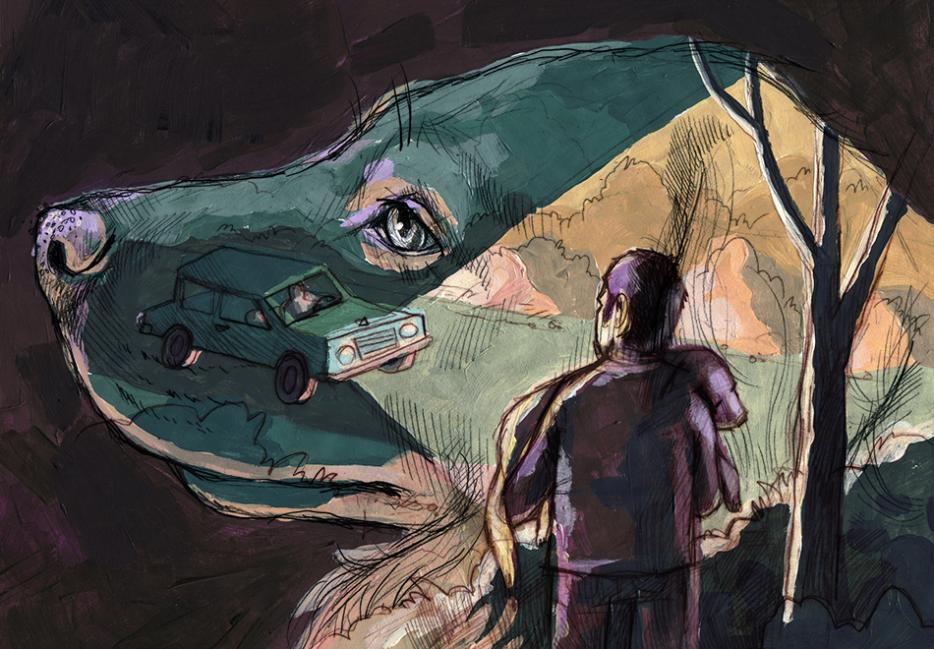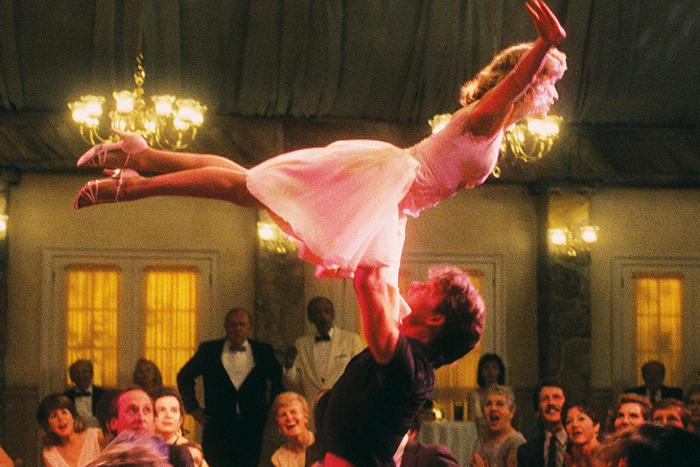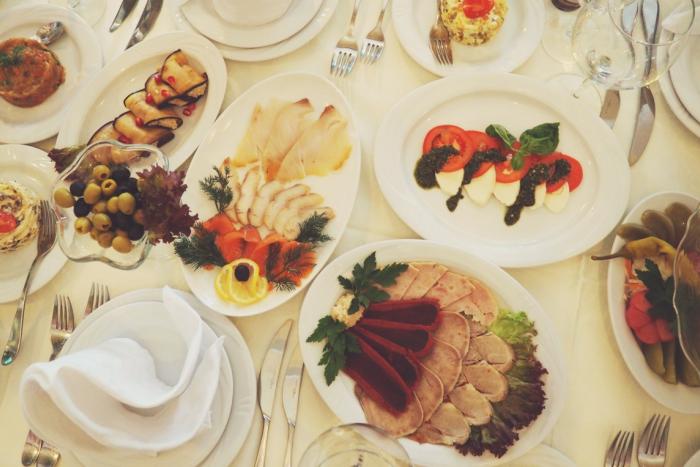He was standing in the woods with a dead dog in his arms. The dog’s name was Fluffy. It was his daughter Jess’s dog, although she was too young to take responsibility for it, apart from calling it – him – Fluffy. He – it – Fluffy – was a cross between various breeds, including some sort of spaniel and some kind of terrier and maybe a bit of something more exotic and expensive. Pyrenean. Bedlington. Bouvier Des Flandres. Those were names that his wife would toss in the air when there were visitors. As though this dog, given as a puppy to their daughter by the old lady down the road whose mongrels mated with anything vaguely canine, was something classier than it was cracked up to be. A bargain with unsuspected prestige value. His wife specialised in those. Just like the designer clothes she kept claiming to have found “in a little charity shop for a few quid” (provoking envy in her circle of drinking pals), Fluffy was supposed to be a cocktail of purebreds disguised as a common mutt, a rare item that a connoisseur dog-breeder might pay a lot of money for. He certainly had a coat worthy of his name. And, dead, he was bloody heavy.
Syd was standing in the woods, at dawn, with a dead dog in his arms. The dog’s name was Fluffy. It was the only thing his daughter seemed to take pleasure in these days. She’d lost interest in playing with her toys, she didn’t like being read to, she wasn’t eating much – just a few forkfuls of each meal, if that – and she hated school. But she would lie on the dining room floor, under the table, with her head against Fluffy’s ribcage, idly stroking his curls, accepting the occasional lick from his tongue. He would snooze, and she would lie open-eyed, staring at the underside of the dining room table, at the flecks of paint and the tiny dried barnacles of snot, while Ann and Syd bitched and sulked and yelled at each other. “You could at least be useful and take the dog out to do his business,” Ann would say to Jess. (In private, his wife rarely spoke Fluffy’s name and certainly did not use words like “Pyrenean”. She used words like “fucking useless excuse for a man” and “gutless piece of shit”.)
Syd was standing in the woods, shifting the weight of the dead dog higher onto his chest, heaving the animal’s head – heavy as a steam-iron full of water – over his shoulder. Underneath his parka, his clothing was humid with sweat. His left thigh was damp with piss that had leaked out of Fluffy’s unsphinctered bladder. Fluffy was twenty kilos of meat wrapped around a tubular frame of bone. There was no longer any denying that he wasn’t well. There was no longer any denying that he had problems that were sufficiently serious to warrant the attention of a vet.
When Ann had visitors – not her drinking pals, but visitors from outside her witches’ circle of grievance – she would call her husband “Sydney”. It made him sound like a metropolis of world standard, a city of manhood that she’d decided to get herself a place in. “Syd” was a name fit for a gardener or a garbage man. It was the name she called him in private, when she wasn’t calling him nothing or a piece of shit. But of course it was all semantics, anyway. Labels for things instead of the real things themselves. Like the way his being off work on half pay was redefined as “ruining my life” and “throwing our future down the toilet”. Like the way his impossible stresses at the college and his breakdown were translated as “sheer selfishness” and “all a big wank”. But he knew which of the two of them had a stronger grip on the truth. He knew that the designer clothes which she’d supposedly found in a charity shop “for a few quid” had really been bought in pretentious boutiques at great cost, paid for by him. Stick-thin shopgirls in vintage attire had handed him the credit card gadget and turned their fake eyelashes discreetly aside while he typed in his PIN. All because Ann wanted to be the sophisticated bohemian shopper who knows that style cannot be bought but attaches itself freely to the right woman like a leaf blown on the breeze. All because Ann liked to pretend that adorable clothes called out to her from wicker baskets in Save The Children shops, because they knew she was The One. £275 price tags weren’t part of that fantasy. They were a dirty compromise, a job for garbage-man Syd.
But he shouldn’t be thinking about clothes or price tags. That was what got you in trouble in the first place, thinking about the wrong things when there were much more important issues to tackle. That was what got you into the woods, holding a dead dog. A dead dog that wouldn’t be dead if you’d taken its symptoms seriously. “Fluffy didn’t eat his dinner again, Dad,” Jess kept saying, and he would say, “Well, you didn’t touch yours either.” As if both Jess and the dog were registering their protest against Ann and Syd’s marriage going toxic. There was nothing wrong with his spaghetti Bolognese, nothing wrong with his tuna casserole, nothing wrong with his cauliflower cheese, nothing wrong with the cans of Pedigree Chum that he would fork out into the dogbowl. But that’s how life works. You lose your job, your wife turns vicious, and instead of the rest of the world looking on sympathetically and doing its best not to add to your stress, the neighbours throw a tantrum about where you left your wheelie bin and the central heating breaks down and the book club stings you for thirty quid for that deluxe edition of The Etruscans you neglected to tell them you didn’t want, and your daughter develops an eating disorder at the age of six. And the dog stops playing its family pet role, drops the ball so to speak, and lies under the dining room table looking miserable, as if to say “Stop yelling at each other, I’m not going to eat until you stop yelling at each other,” but really he’s saying, “I’ve got cancer of the liver or a bowel obstruction or some such thing, so how about organising a trip to the vet, Sydney, old son?”
Sydney, ex-principal-breadwinner for an ex-thriving family, was standing in the woods with an ex-dog in his arms. Actually, “woods” was a bit of stretch. Ann had added “Banchory Woods” to their address, despite murmurs of disapproval from the postman who knew damn well that there was no such place. There was a copse of green poplars that had been planted some while back as a windbreak, to assist traffic safety on the motorway. The copse was just a few hundred yards long and fifty feet deep at its thickest, thinning out to a single line of trees at each end. Syd was standing in the thickest part, breathing heavily, with the downy forehead of Fluffy lolled against his cheek. There was a plan and he would see it through. He – Sydney – Syd – was waiting for the chance to rescue his dignity in the eyes of his daughter.
Jess was asleep right now, he presumed. It was a Sunday and still not fully light. She was a heavy sleeper, especially at weekends when the drama of getting ready for school was off. At 7:30 or thereabouts, she might consent to eat a small bowl of Rice Krispies, as long as the krispies were still crisp but the milk was room temperature. Syd achieved this by removing the milk carton from the fridge twenty minutes before the Jess’s cereal was dispensed. At much the same time, he would turn on the heater in the bathroom so that by the time Jess had her bath the chill would be off the air, and he would get the coffee percolator going for Ann, and he would take out the empty booze bottles and toss them in the recycling bin even if Ann had left some dregs undrunk. And, on a normal day when he was not standing in the woods with a dog dead in his arms, he would slosh some fresh water into Fluffy’s bowl, scrape the dried-out, discoloured Pedigree Chum into the bin and replace it with a fresh clump. It was actually a lot to remember for a man who was on antidepressants and who was worn out by panic attacks and suicidal thoughts. But even so, he should have found room in his schedule for a phone call to the veterinary surgery.
Syd was standing in the woods, while Jess was (most probably) sleeping back at the house and Ann was (most definitely) unconscious and Fluffy was right here, without consciousness, in his arms. The precise time when Fluffy had ceased to be an animal and begun to be twenty kilos of meat wrapped around a tubular frame of bone could not be determined. It must have been somewhere between midnight, when Syd went to bed, and four A.M., when his routine attack of chest-seizing anxiety woke him. The hours between four and dawn were usually restful ones for him, characterised by an absence of drama, a longish lull in hostilities. A time when he would pad around the porcelain-tiled kitchen floor in his socks, making himself toast and a cup of tea; a time for reading newspaper supplement articles about ageing pop stars, Bambi-eyed actresses, Afghan poppy farmers and spinach tarts. Fluffy would continue to snore under the table, or make that peculiar whuffling noise that dogs make. Or, in the alternative scenario that had been played out this morning, Fluffy would be motionless and silent, and, when Syd nudged him with his socked foot, the dog’s rigid haunch would slide smoothly across the floor like a basket of clothing. Yes, that was a very credible scenario, especially after a night of furious argument with Ann, in which she’d promised him that if he tried to divorce her she would really give him something to be depressed about. In retrospect, it was the logical next move, a far more likely Sunday morning set-up than the one featuring a live dog.
The body in Syd’s arms smelled very doggy, so close to him against his breast. It wasn’t a decay smell, nor even a raw meat smell, but an intensification of the odour that had always been part of Fluffy’s contribution to the household. The piss on Syd’s trouser leg, although uncomfortable, didn’t smell much at all – or maybe he was kidding himself, out here in the woods with a thousand miles of empty air around him. As soon as he got back to the house, he would have to jump straight into a shower and shove his clothes in the washing machine. The cycle would be over before Ann even came to the surface. He could picture his trousers clearly in his mind, draped over the long, grey radiator in the hallway; he could see the linings of the pockets pulled out for more efficient drying, wrinkly and flaccid like oversized condoms. The clarity of the vision was as sharp as documentary film footage. It was captured, obviously, from the authentic future. It was proof that he would achieve what he needed to achieve with the dog.
He was standing here, in the woods, to choose the right reality. It was vitally important to select the correct one. There was an alternative version of today which must not unfold: the version where Jess understood that Fluffy had died because her father didn’t care enough, that there was nothing a child could do to make her father care enough, not even covering her ears in school, not even getting a bowel obstruction and going to hospital, not even writing letters to God, and certainly not reminding him every day that Fluffy hadn’t eaten his dinner. In that same version, Ann would suddenly exhibit an intense sentimental attachment to Fluffy she’d never shown when he was alive, and attempt to whip up a false solidarity with Jess by berating Syd for being so fucking unbelievably useless that he would sit in the kitchen reading old magazines day after fucking day when the dog was literally dying at his feet.
No, that wasn’t the reality he was here to organise. In the correct reality, the bearable, humane reality, Fluffy wandered away from the family home, sometime during the night, to have an adventure in the great outdoors. And, crossing the road, he was hit by a car. It happened every day, in lots of places in the world. Today, it would happen here.
But it couldn’t happen without effort. Nothing happened without effort, except catastrophe. Trusting that things would be OK sent out a signal to the massed forces of chaos to get busy unravelling your life on all levels, with the sickening speed of fire and the malignant slowness of woodworm. Keeping just one little patch of security safe required superhuman strength, and good luck was doled out only to those who didn’t need it. He’d already tried depositing Fluffy on the road, in the right lane where the city-bound traffic was bound to go. Traffic was virtually non-existent at dawn on Sunday morning, but even so there had been three cars, travelling at moderate speed through the misty twilight. Each of the three cars had swerved to avoid the animal’s body. The third car had stopped afterwards, and the driver – a middle-aged woman wearing a long lilac dress and an incongruous white parka – had walked back to Fluffy and stood near him for several minutes, looking. Then she returned to her car and drove on. The message was clear. Dogs did not get hit by cars unless they jumped onto the road without warning. Fluffy would have to jump onto the road without warning. Syd would have to make this happen.
He stood amongst the foremost trees, the ones closest to the gutter. The leaves were speckled black with some sort of smog disease. On a different day, he might have taken a leaf back for Jess, to introduce her, in the gentlest way possible, to the notion that all good things turn bad, that it was happening in nature, not just in their own family. Today, the trees were just camouflage. He hadn’t eaten breakfast and the muscles of his arms, supporting the dead weight of the dog, were complaining. Or not exactly complaining, just suffering the silent pangs of imminent defeat. Food was fuel and it had been foolish of him not to stuff a mouthful of something, even dry bread, into his mouth before leaving the house. It had been even more foolish to imagine that a medium-sized dog, a normally energetic ecosystem of spaniel, terrier, Pyrenean, Bedlington and Bouvier Des fucking Flandres should be able to stay alive on an occasional lick of Chum. Fluffy’s ribs were hard against his fingers, the racks of bone protruding through the clammy fur. Syd used them for purchase. Any minute now, a car would come around the bend and Fluffy would sail through the air.
Once, in a hotel room in a faraway town seven years ago, he and Ann had been locked in a naked embrace. They were doing their best to be animals. His penis was inside her body. She was wet for him and her arms clutched him tight but there was a grimace on her face that looked alarmingly unlike joy and he couldn’t help thinking that something more was required of him but he couldn’t guess what. In pornographic pictures he had seen men fucking women while standing upright, the woman hoisted aloft, impaled on a sturdy dick, her body wrapped around the man’s as though he were a tree trunk. In the hotel room in the faraway town seven years ago, Syd tried to lift Ann off the bed, using the leverage of their joined genitals and the strength of his arms and back. In the attempt, he had to break the rhythm of their intercourse. “What are you doing?” she said. He couldn’t remember the rest. Only that he had never – not then, not in the years since – borne her aloft.
He looked down at his shoes, half submerged in fallen leaves. One of his favourite games with Jess was when she placed her feet on top of his and let him walk her around. She would laugh so much; they must have played that game a hundred times. Well, maybe fifty. Or twenty. Or maybe, if he were pinned down mercilessly to the truth, fifteen or sixteen. Still a lot. And maybe it would happen again someday.
The horizon glowed faintly, tinted by approaching headlights. The sun was almost fully up, so whoever was in this next car must be a careful driver, or else hadn’t adjusted to the changed conditions. Syd shifted the weight of the dog and re-embraced it for the final time – hopefully. Back at the house, his daughter would soon be ready for a bowl of Rice Krispies with milk the way only Daddy knew how to make it, and he would tell her how he’d been out looking for Fluffy and failed to find him, and she would of course insist on looking again, and they would go out together, father and daughter on a sunny Sunday morning, looking for Fluffy and calling his name, and eventually they would walk as far as it took to find him, and then he would hold her, console her even though she would be inconsolable, and tell her that everything would be all right. Which would be a lie, a lie more outrageous than anything Ann had ever come up with, but it would be a lie they shared in a moment of raw, instinctive love, and if there was any justice in the universe they would be able to cling to that memory whatever else might be in store for them.
For one last second, he was standing in the woods with a dead dog in his arms. He had just this one chance. He was ready.






